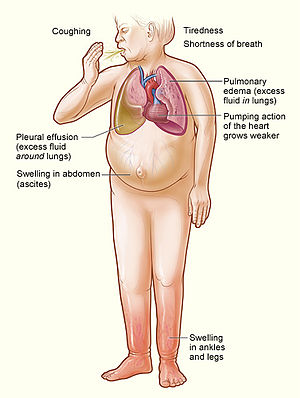Systolic dysfunction
| Heart failure | |
|---|---|
| Synonyms | chronic heart failure (CHF), congestive cardiac failure (CCF) |
 |
|
| The major signs and symptoms of heart failure | |
| Specialty | cardiology |
| Symptoms | shortness of breath, feeling tired, leg swelling |
| Duration | lifelong |
| Causes | heart attack, high blood pressure, abnormal heart rhythm, excessive alcohol use, infection, heart damage |
| Risk factors | smoking, sedentary lifestyle |
| Differential diagnosis | kidney failure, thyroid disease, liver disease, anemia, obesity |
| Medication | diuretics, cardiac drugs |
| Frequency | 2% of adults in developed countries; 6–10% in adults >65 |
| Deaths | 35% risk of death in first year after diagnosis |
| Classification | |
|---|---|
| External resources |
Heart failure (HF), often referred to as congestive heart failure (CHF), occurs when the heart is unable to pump sufficiently to maintain blood flow to meet the body's needs. Signs and symptoms commonly include shortness of breath, excessive tiredness, and leg swelling. The shortness of breath is usually worse with exercise, while lying down, and may wake the person at night. A limited ability to exercise is also a common feature.Chest pain, including angina, does not typically occur due to heart failure.
Common causes of heart failure include coronary artery disease including a previous myocardial infarction (heart attack), high blood pressure, atrial fibrillation, valvular heart disease, excess alcohol use, infection, and cardiomyopathy of an unknown cause. These cause heart failure by changing either the structure or the functioning of the heart. There are two main types of heart failure: heart failure due to left ventricular dysfunction and heart failure with normal ejection fraction depending on whether the ability of the left ventricle to contract is affected, or the heart's ability to relax. The severity of disease is usually graded by the degree of problems with exercise. Heart failure is not the same as myocardial infarction (in which part of the heart muscle dies) or cardiac arrest (in which blood flow stops altogether). Other diseases that may have symptoms similar to heart failure include obesity, kidney failure, liver problems, anemia, and thyroid disease.
...
Wikipedia
